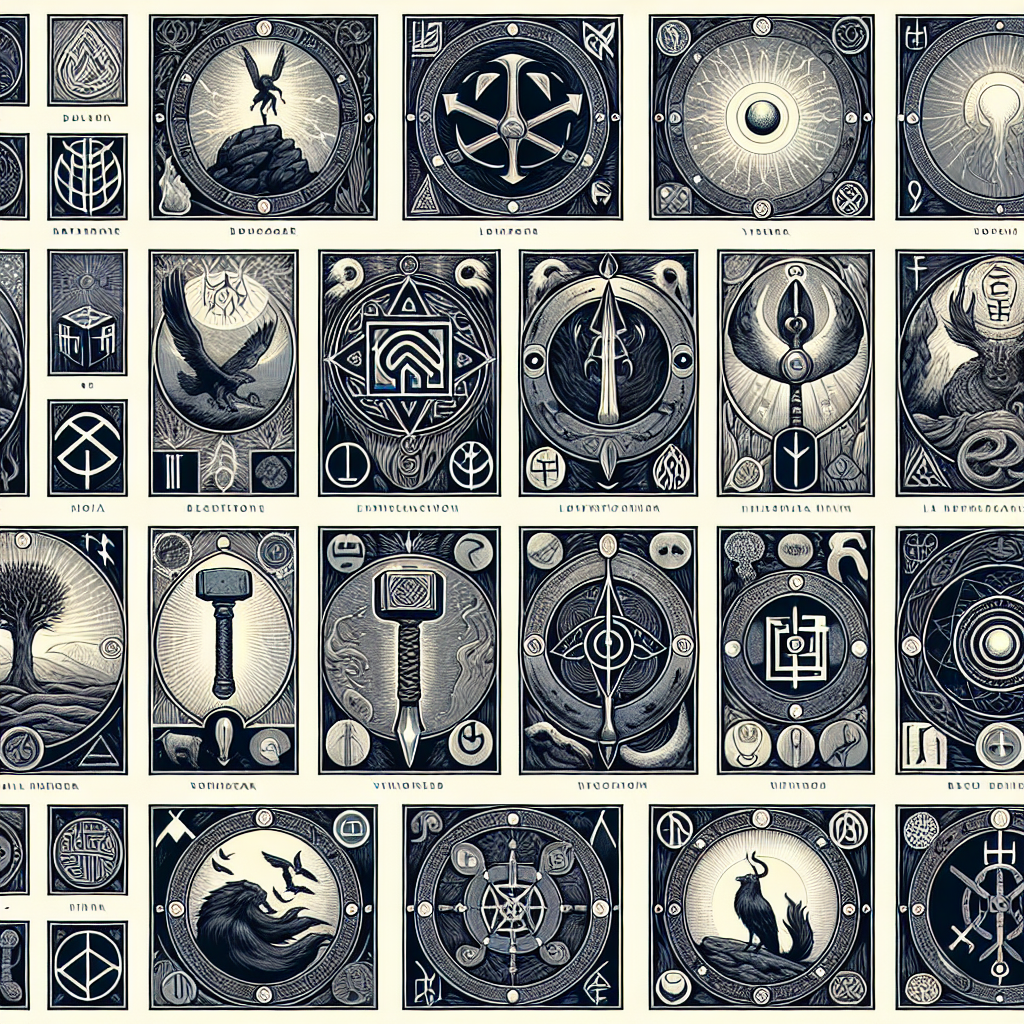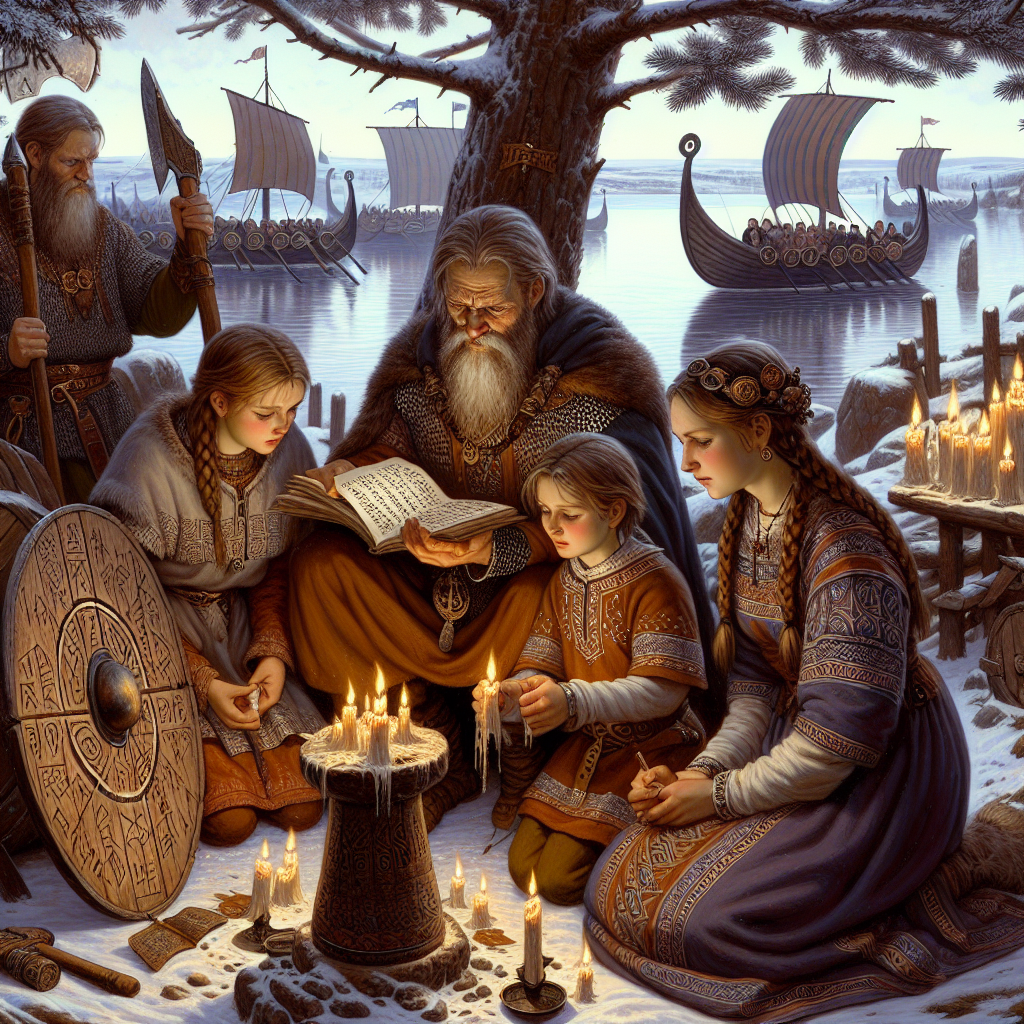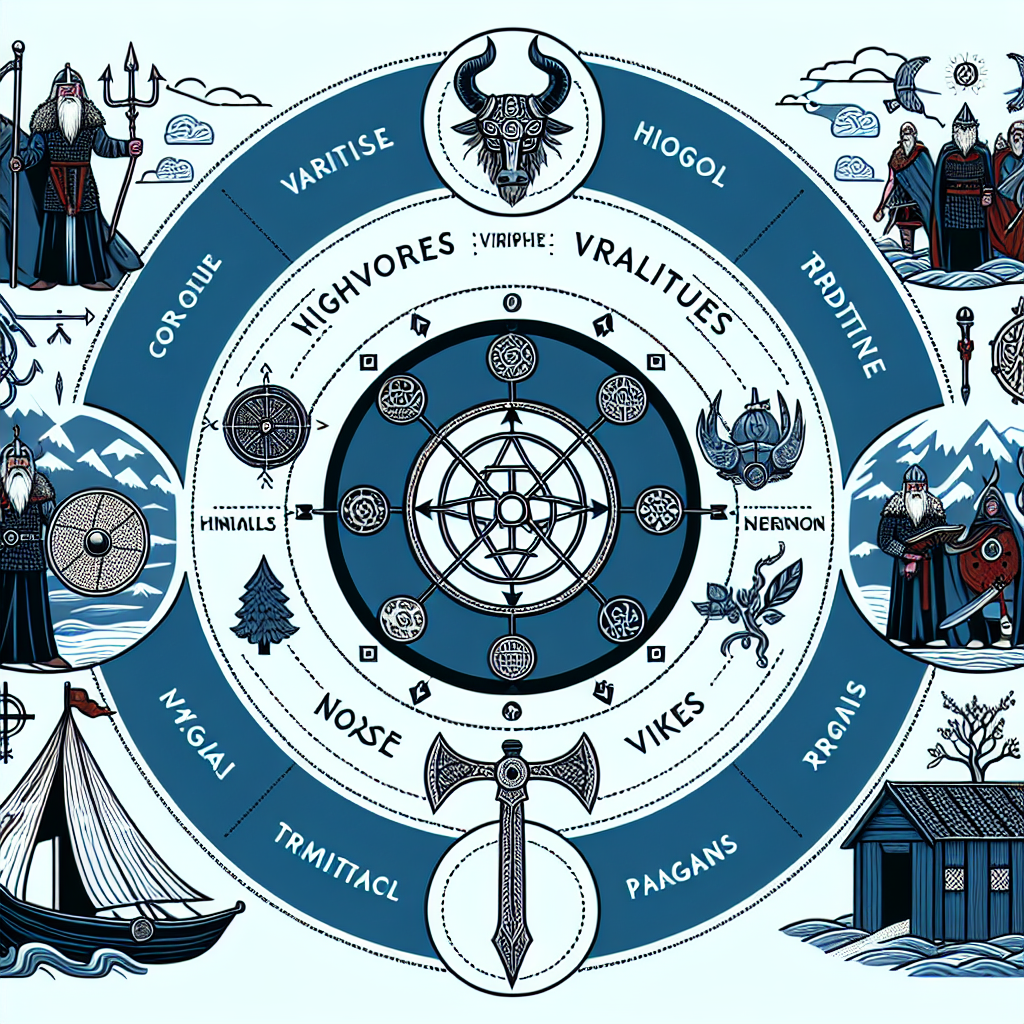As an Amazon Associate I earn from qualifying purchases.

What Are the 18 Core Values of Norse Paganism?
The 18 Core Values of Norse Paganism are guiding principles derived from the ancient Norse belief system that continue to hold significant influence today. These values are deeply rooted in the traditions and literature of the Norse people, often derived from texts such as the Poetic Edda and the Sagas. In today’s world, these values serve as a moral compass for those who identify as Heathens or Asatru, guiding their actions and decisions in daily life.
Honor and Truth
Honor is a fundamental value in Norse Paganism, emphasizing the importance of maintaining one’s reputation and moral integrity. This value is often reflected in personal and societal interactions, ensuring that individuals act with respect and dignity.
Truth, closely related to honor, requires individuals to be honest with themselves and others. The emphasis on truth fosters trust within the community and encourages personal accountability.
Courage and Perseverance
Courage is celebrated in Norse Paganism as the ability to face adversity and challenges without succumbing to fear. This value is not just about physical bravery but also about standing up for one’s beliefs and moral principles.
Perseverance complements courage, reflecting the determination to continue striving toward goals despite obstacles. It is about resilience and the strength to keep going even when the path is difficult.
Wisdom and Discipline
Wisdom is highly valued, representing knowledge gained through experience and reflection. It encourages individuals to seek understanding and to use their knowledge for the betterment of themselves and their community.
Discipline involves self-control and the ability to maintain focus on one’s goals. It is about creating structure in one’s life that supports personal growth and achievement.
Fidelity and Hospitality
Fidelity emphasizes loyalty and faithfulness to one’s family, friends, and community. This value fosters strong relationships and a sense of responsibility toward loved ones.
Hospitality is integral to Norse culture, highlighting the importance of welcoming others and providing for guests. It is about generosity and the willingness to help those in need.
Self-Reliance and Industriousness
Self-Reliance promotes independence and the ability to take care of oneself without overly depending on others. It is about empowerment and confidence in one’s abilities.
Industriousness encourages hard work and the diligent pursuit of one’s endeavors. It values productivity and the contributions one makes to society through effort and skill.
Frith and Kinship
Frith refers to the concept of peace and harmony within a community. It involves creating and maintaining bonds that ensure mutual respect and cooperation.
Kinship underscores the significance of familial and community ties. The value stresses the importance of these relationships in providing support and fostering a sense of belonging.
Modern Relevance of the 18 Core Values
In contemporary society, the 18 Core Values of Norse Paganism are embraced by many as a framework for ethical living. These values offer solutions to modern problems by providing clear guidance on how to live honorably and harmoniously with others. For instance, practicing hospitality and community frith can significantly improve social cohesion and mutual support in urban environments. Additionally, the discipline and industriousness values can bolster professional development, encouraging individuals to thrive in their careers while maintaining a balanced life.
Understanding the 18 core values of Norse Paganism provides a profound insight into Norse spirituality, Viking traditions, and pagan principles that have been passed down through generations.
1. **Honesty (Sannr)**: In Norse pagan beliefs, honesty is the foundation of all relationships. The legendary sagas and texts often emphasize the importance of being truthful, not only in speech but in actions.
2. **Honor (Heiðr)**: Honor occupies a central place in Norse spirituality. It represents the moral framework within which societal and personal actions are weighed and deemed worthy or not.
3. **Courage (Ár)**: Viking traditions highly valued courage, both in battle and in facing everyday challenges. It was seen as a fundamental value to confront fear and uncertainties.
4. **Loyalty (Fóstbrœðralag)**: Loyalty towards kin, friends, and deities was crucial in Norse pagan beliefs. The sagas provide multiple accounts of deep bonds and unwavering loyalty among Vikings and their gods.
5. **Hospitality (Vesel)**: This pagan principle was essential for survival in the harsh climates of the Norse world. Hospitality ensured that travelers and strangers were provided for, fostering strong community ties.
6. **Self-Reliance (Sjalfstæð)**: Norse spirituality encourages self-reliance, emphasizing the importance of being able to take care of oneself and one’s family without undue dependence on others.
7. **Perseverance (Þrautseigja)**: Courageous and enduring in the face of adversity, perseverance is a highly valued trait in Norse paganism. It teaches the importance of enduring hardship and overcoming obstacles.
8. **Wisdom (Vísi)**: Wisdom is deeply cherished in Viking traditions. The Norse gods themselves, particularly Odin, are often associated with the pursuit of wisdom and knowledge.
9. **Discipline (Aga)**: Discipline is a vital component of Norse pagan beliefs, ensuring that individuals can maintain honor and achieve their goals through consistent effort and control.
10. **Industriousness (Vinna)**: Hard work and diligence were crucial for survival in the Viking age. Industriousness is seen as a value that brings prosperity and self-respect in Norse spirituality.
11. **Self-confidence (Sjálfstraust)**: Confidence in one’s own abilities and worth is a core value in the pagan principles of Norse tradition. It bolsters personal development and achievement.
12. **Truth (Sannleikr)**: Closely related to honesty, truth is a revered value. Lies and deceit were seen as destructive to the fabric of society in Norse pagan beliefs.
13. **Fidelity (Tryggð)**: Fidelity within marriage and other close relationships is a core tenet in Norse spirituality, reflecting the importance of trust and loyalty.
14. **Responsibility (Ábyrgð)**: Taking responsibility for one’s actions and duties is a central principle in Norse paganism. It ensures that community and family can rely on each individual.
15. **Steadfastness (Stöðugleiki)**: Maintaining loyalty and dedication through all trials and tribulations is seen as an important virtue in Viking traditions.
16. **Bravery (Hugrekki)**: Bravery goes beyond mere courage; it represents the daring to face any odds, even when the outcome is uncertain, which is a hallmark of Norse pagan beliefs.
17. **Equality (Jafnrétti)**: Equality between individuals, particularly in terms of justice and opportunity, is a core value in Norse paganism, with the gods themselves often reflecting these ideals.
18. **Community (Samfélag)**: The social fabric of Viking life was centered around a sense of community and collective responsibility, a core aspect of Norse spirituality.
According to recent studies, approximately 1% of modern Icelanders identify with Norse paganism, demonstrating the enduring relevance of these core values to contemporary practice.
Hospitality
I’ve always found the value of hospitality to be deeply ingrained in my upbringing and personal experiences. Growing up, my family was known for hosting gatherings and treating guests as extended family. This sense of hospitality is something I strive to maintain in my own home. Whenever friends or family visit, I go out of my way to make them feel comfortable, providing ample food, drinks, and entertainment, aiming to create a welcoming environment where everyone feels at ease.
One memorable instance of this was when a friend from out of town needed a place to stay. Despite the impromptu nature of the visit and the short notice, I rearranged my schedule to ensure my friend felt welcomed and taken care of. It wasn’t just about providing a bed and meals but creating an atmosphere of warmth and openness, where they felt like part of the household.
Practicing hospitality has also allowed me to build stronger relationships and a supportive community. It’s more than just a social obligation; it’s a genuine expression of care and respect for others, aligning perfectly with the Norse belief in valuing and honoring guests.
Honor
Honor is a concept that dictates much of how I interact with others and make decisions. I’ve always believed that one’s word and integrity are paramount. There was a time when I made a promise to help a friend with a challenging project, despite other commitments. Keeping my word required sacrificing some personal leisure time, but I knew my honor was at stake, and adhering to this value strengthened our friendship and trust.
In professional settings, honor takes the form of honest dealings and transparency. Early in my career, I faced a situation where I had to choose between cutting corners to achieve quick success or maintaining ethical standards despite the potential for slower progress. Opting for the latter, though initially challenging, solidified my reputation as trustworthy and dependable, which has been invaluable over time.
Living with honor also means acknowledging and taking responsibility for mistakes. I once mishandled a project at work, leading to minor setbacks. Instead of deflecting blame, I owned up to the error and worked diligently to rectify the situation. This commitment to honor earned me respect from my colleagues and superiors, reinforcing the importance of this core value.
Self-Reliance
Self-reliance is a value that resonates strongly with my life story. Growing up in a rural area, I learned early on the importance of being capable and resourceful. My family cultivated a lifestyle where fixing things yourself and using available resources efficiently was a norm. This upbringing instilled in me a strong sense of independence and confidence in my ability to handle various challenges.
During my college years, I often worked multiple jobs to support myself, balancing academic responsibilities with financial independence. This period of my life taught me valuable lessons in time management, resilience, and the significance of relying on my own skills and determination to achieve goals. It’s an experience that continues to shape my work ethic and personal growth.
Even in adult life, self-reliance manifests in everyday tasks, from home repairs to budgeting and personal development. For example, during a recent home renovation project, instead of hiring outside help, I chose to learn and tackle the tasks myself. This hands-on approach not only saved money but also provided immense satisfaction and a sense of accomplishment, perfectly reflecting the essence of self-reliance in Norse Paganism.
Perseverance
The value of perseverance has been a guiding force through many of life’s trials and tribulations. One profound experience was overcoming a prolonged period of illness. The journey to recovery was long and arduous, filled with moments of doubt and frustration. However, embracing the Norse value of perseverance helped me push through the hardest days, focusing on incremental progress and celebrating small victories along the way.
Another instance where perseverance played a crucial role was in my career. Transitioning between jobs and facing periods of uncertainty tested my resilience. Continuous effort, patience, and maintaining a positive outlook eventually led to a rewarding position that aligned with my professional aspirations and personal values.
Perseverance isn’t just about enduring difficult times but also involves consistent effort toward personal and collective goals. Whether it’s committing to a fitness routine, pursuing a long-term project, or nurturing relationships, the steadfast determination to keep moving forward shapes a resilient and fulfilling life, embodying the spirit of perseverance in Norse Paganism.
u003cH2u003eWhat are the 18 core values of Norse Paganism?u003c/H2u003e
u003cpu003eThe 18 core values of Norse Paganism encompass virtues such as honor, courage, loyalty, and wisdom, which are derived from ancient Norse culture and mythology.u003c/pu003e
u003cH2u003eHow do Norse Pagans practice their spirituality?u003c/H2u003e
u003cpu003eNorse Pagans practice their spirituality through rituals, offerings to deities, meditation, and gatherings known as blóts and sumbels. These practices often take place in natural settings.u003c/pu003e
u003cH2u003eWho are the primary deities in Norse Paganism?u003c/H2u003e
u003cpu003eThe primary deities in Norse Paganism include Odin, Thor, Freyja, and Loki, among others. Each deity represents different aspects of life, nature, and the cosmos.u003c/pu003e
u003cH2u003eAre the Norse Pagan values applicable in modern times?u003c/H2u003e
u003cpu003eYes, the values such as honor, courage, and wisdom are timeless and many practitioners find them relevant and applicable in their daily lives in the modern world.u003c/pu003e
u003cH2u003eWhat is a blót and how is it conducted?u003c/H2u003e
u003cpu003eA blót is a sacrificial ritual where offerings are made to the gods, spirits, and ancestors. It involves gathering, reciting prayers or poems, and sharing food and drink.u003c/pu003e
u003cH2u003eIs Norse Paganism a polytheistic religion?u003c/H2u003e
u003cpu003eYes, Norse Paganism is a polytheistic religion, meaning that it involves the worship of multiple gods and goddesses, each with their own distinct roles and attributes.u003c/pu003e
u003cH2u003eHow do Norse Pagans view the afterlife?u003c/H2u003e
u003cpu003eNorse Pagans traditionally believe in several afterlife realms, such as Valhalla for warriors and Hel for most people. The afterlife destination is determined by one’s actions and how they died.u003c/pu003e
u003cH2u003eWhat role do ancestors play in Norse Paganism?u003c/H2u003e
u003cpu003eAncestors hold a significant role in Norse Paganism, where they are honored and remembered through rituals and offerings. They are often seen as guides and protectors.u003c/pu003e
u003cH2u003eHow do modern Norse Pagans celebrate festivals?u003c/H2u003e
u003cpu003eModern Norse Pagans celebrate festivals such as Yule, Ostara, and Midsummer with feasts, rituals, and community gatherings, often incorporating traditional Norse customs and symbolism.u003c/pu003e
u003cH2u003eWhat texts are important in Norse Paganism?u003c/H2u003e
u003cpu003eImportant texts in Norse Paganism include the Poetic Edda, the Prose Edda, and the sagas, which contain the myths, stories, and teachings of the Norse gods and heroes.u003c/pu003e

## Conclusion
Norse Paganism is deeply rooted in a profound respect for nature, community, and honor, embodying principles that emphasize strength, courage, and wisdom. The 18 Core Values, such as hospitality, truth, and perseverance, reflect a holistic worldview where personal integrity and loyalty to one’s kin are paramount. These values guide practitioners in their daily lives, reinforcing a sense of identity and purpose grounded in ancient traditions. They not only dictate interpersonal conduct but also promote a harmonious relationship with the natural world, embodying the belief that humans are integral parts of the larger cosmos.
The spiritual practices of Norse Paganism, including rituals and offerings to the gods, ancestors, and land spirits, further solidify these core principles. Embracing virtues like self-reliance and industriousness, Norse Paganism encourages a balanced life where the physical and spiritual realms are interwoven. These values are not static but are continuously interpreted and adapted by modern practitioners, ensuring their relevance. Thus, the 18 Core Values serve as a timeless framework that sustains the rich, vibrant tapestry of Norse spirituality and Viking heritage, fostering both personal growth and communal harmony.
Amazon and the Amazon logo are trademarks of Amazon.com, Inc, or its affiliates.


